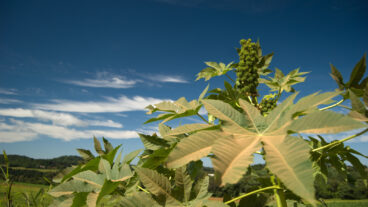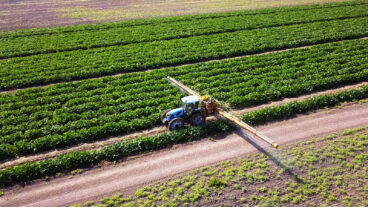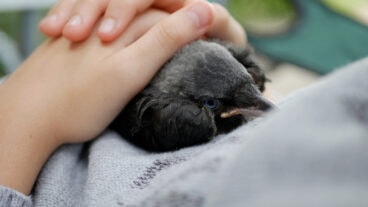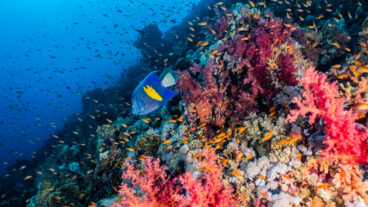When the Bedouin of Israel’s Negev region see Dr. Michael Van Straten coming, they breathe a sigh of relief. And so do their camels. A 44-year-old veterinarian, Van Straten’s unique medical practice involves treating all kinds of animals, but his expertise lies in the ailing ornery desert dwellers.
“I wish I could treat only camels,” he admits. “But there just aren’t enough of them to make a living. So instead I have the best of both worlds: I divide my time between Israel’s ultra-modern and computerized dairy herds and the camels, about 95% of which are owned by quasi-nomadic Bedouin. It’s an interesting mix, and I love the contrast.”
Van Straten was born in Israel but lived in the US as a child – New Jersey and Minnesota – while his French-born mother and Dutch father worked and studied. “We moved back to Israel when I was about 10,” he says. “I didn’t grow up on a farm. I had pets, but no camels. In school, I liked biology, and I liked working with my hands, so veterinary medicine appealed to me, especially working with farm animals. A friend had a dairy farm, and I liked working there.
“My first introduction to camels came when I worked as a guide on a camel farm. Knowing how to handle camels is about 60% of my work. If you don’t know how to handle them, then all the medical knowledge in the world wouldn’t help.”
According to an informal survey conducted in the early 1990s, there were approximately 20,000 camels in Israel. Today, the camel count hovers between 2,500 and 3,000. For Van Straten, the rapid drop in numbers signifies a big problem.
“Camels are threatened, there’s no question about that,” Van Straten told ISRAEL21c. “Worldwide, the camel population is shrinking, and even though here in Israel we don’t have some of the diseases that are decimating camel herds elsewhere, the decline in the population is very serious.”
Today, Van Straten’s expertise in camels is much sought after by not only his Bedouin clients who call him ‘Dr. Michael’, but also by the IDF, by the Agriculture Ministry in Israel, several camel farms, and anyone else who might have a question about camels.
“For the most part, public agencies are aware of the problems camels are facing, and would like to help, but unfortunately, funds are pretty limited,” he said.
Many of the problems camels face stems from the lack of grazing. “Camels are natural grazers, but today, few camels live by eating grasses, bushes or shrubs. The Agriculture Ministry doesn’t recognize the camel as a grazing animal like sheep, goats or cows, so generally they aren’t permitted to forage on natural-growing grasses. A few Bedouin do get permission to graze their animals, but for the most part, a Bedouin family will have a camel or two near the home kept for milk,” he said, adding that camels are less expensive to keep than cows.
Often, the family camel will be tied right behind the house, Van Straten says, and that causes problems, especially for the females. “Israel has a bigger problem than some other countries with camels who suffer calving problems,” he notes. “If the camel is kept tied, and not grazed, she doesn’t get enough exercise, which is very bad when it comes to giving birth. Secondly, a diet of plain hay – let alone lower quality straw – doesn’t provide the right nutrition, which again, causes problems with calving.”
As a result, much of Van Straten’s work involves working with female camels either in fertility issues or in giving birth. “Because the Bedouin keep the camel primarily for milk, it’s critical that the camel be able to calve,” he says. “If the camel has fertility problems, or trouble giving birth, that’s a serious issue. But it’s not just a milk issue – to an Arab, camels are much more than a food source, and more than just a pet. Camels are integral to the whole Bedouin tradition.”
Van Straten laughs when he says, “I’ve had Bedouin tell me, ‘Doctor, you’ve gotta save this camel! I love it more than I love my kids!’ You have to be careful of generalizations, of course, but to the Bedouin, owning camels is a part of the culture. If someone comes to visit riding a camel, Bedouin tell me, he’ll be treated with more respect than if he arrives riding a donkey or a horse. Then, too, camels are worth quite a lot of money. A good milking female would be valued at something over NIS 12,000 (about $2,900). That’s why they call me when they have a sick camel.”
It was Van Straten’s concern over improper nutrition that led him to formulate a vitamin/mineral supplement for camels. He explained that camels often aren’t getting proper nutrition from the hay or straw they’re fed. So another way to help keep the camel healthy is to supplement its food with the vitamins and minerals they need. The powder which is mixed in the camel’s water contains vitamins A, B, and E, and zinc, selenium and copper
“The supplement is especially beneficial to females, because it aides in fertility and birth,” he said, adding that recent studies seem to show that female camels need to smell, hear and see male camels in order to be healthy. “If they’re kept entirely away from males most of the time, they’ll suffer fertility problems.”
Another frequent cause of Van Staten’s visits to the camels of the Negev are Israel’s modern highways, which constitute a hazard to camels in Israel’s South. Especially during the winter, when fog or rain obscures night vision, camels who have wandered into the road cause fatal auto accidents. “It’s a big problem,” Van Straten says. “Camels near a road are dangerous – and an even bigger problem is that these accidents make people see camels as a nuisance, and want them to just disappear. That’s not the right answer.”
“When a car hits a camel, of course the camel is killed, but usually it proves fatal for the passengers in the car, too. Because a camels’ legs are very long, when a car hits, the mass of the camel’s body falls on top of the car, crushing the passengers or breaking their necks. It’s very dangerous. I’ve been working with both the road police and the nature reserves to see if there’s a solution. One way might be to mark the camel’s body with reflector paint of some kind, to make them easier to see. As it is, they’re almost perfectly camouflaged by their color.”
Van Straten has even been called to do dental work. “One of my clients had a camel missing for a few days, and when he found her, he discovered she’d apparently wandered into an IDF firing range and had been shot by mistake. A bullet entered her lower jaw, changed direction and came out the front. By the time the owner found her, the wound had festered. I anesthetized the camel and spent three hours reconstructing the camel’s mouth, extracting teeth, and debriding the wound. She came out just fine.”
The fact that Van Straten is Jewish doesn’t bother the Bedouin a bit, he says, and on the contrary, they think it’s amusing that he’s a Jew and knows so much about camels.
“They respect me – and I respect them. I have a kind of special status among them – I’m something unique. When another Arab visits, he can’t talk to the women, and he’s required to sit in a particular part of the family tent and keep his back to the women. But me? They don’t mind my chatting with the women – and I’m a curious person, so for me, that’s interesting.”
For ‘Dr. Michael’ – who’s married with two children – it’s all part of his quest to help the camel population, one camel at a time. Whether he’s helping a mother give birth to her newest 35 kilo – 77 pound – baby, concocting vitamin supplements to ensure a healthier diet, or performing emergency surgery if a camel has eaten something it shouldn’t, Dr. Michael is there. “Camels must be preserved,” he says. “I can’t imagine a desert without camels. They just go together.”












